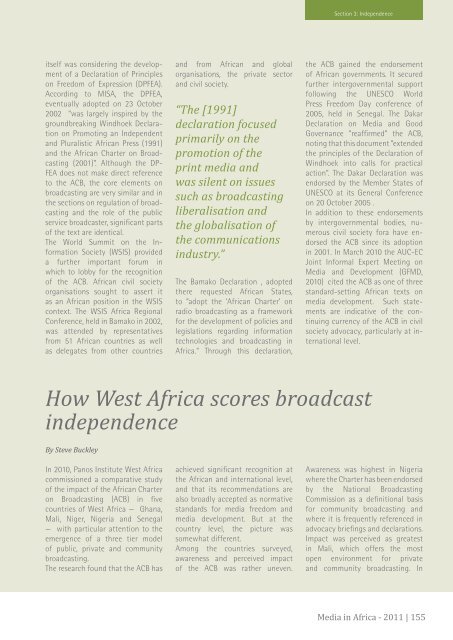Twenty years after the Windhoek Declaration on press freedom
Twenty years after the Windhoek Declaration on press freedom
Twenty years after the Windhoek Declaration on press freedom
You also want an ePaper? Increase the reach of your titles
YUMPU automatically turns print PDFs into web optimized ePapers that Google loves.
itself was c<strong>on</strong>sidering <str<strong>on</strong>g>the</str<strong>on</strong>g> development<br />
of a <str<strong>on</strong>g>Declarati<strong>on</strong></str<strong>on</strong>g> of Principles<br />
<strong>on</strong> Freedom of Ex<strong>press</strong>i<strong>on</strong> (DPFEA).<br />
According to MISA, <str<strong>on</strong>g>the</str<strong>on</strong>g> DPFEA,<br />
eventually adopted <strong>on</strong> 23 October<br />
2002 “was largely inspired by <str<strong>on</strong>g>the</str<strong>on</strong>g><br />
groundbreaking <str<strong>on</strong>g>Windhoek</str<strong>on</strong>g> <str<strong>on</strong>g>Declarati<strong>on</strong></str<strong>on</strong>g><br />
<strong>on</strong> Promoting an Independent<br />
and Pluralistic African Press (1991)<br />
and <str<strong>on</strong>g>the</str<strong>on</strong>g> African Charter <strong>on</strong> Broadcasting<br />
(2001)”. Although <str<strong>on</strong>g>the</str<strong>on</strong>g> DP-<br />
FEA does not make direct reference<br />
to <str<strong>on</strong>g>the</str<strong>on</strong>g> ACB, <str<strong>on</strong>g>the</str<strong>on</strong>g> core elements <strong>on</strong><br />
broadcasting are very similar and in<br />
<str<strong>on</strong>g>the</str<strong>on</strong>g> secti<strong>on</strong>s <strong>on</strong> regulati<strong>on</strong> of broadcasting<br />
and <str<strong>on</strong>g>the</str<strong>on</strong>g> role of <str<strong>on</strong>g>the</str<strong>on</strong>g> public<br />
service broadcaster, significant parts<br />
of <str<strong>on</strong>g>the</str<strong>on</strong>g> text are identical.<br />
The World Summit <strong>on</strong> <str<strong>on</strong>g>the</str<strong>on</strong>g> Informati<strong>on</strong><br />
Society (WSIS) provided<br />
a fur<str<strong>on</strong>g>the</str<strong>on</strong>g>r important forum in<br />
which to lobby for <str<strong>on</strong>g>the</str<strong>on</strong>g> recogniti<strong>on</strong><br />
of <str<strong>on</strong>g>the</str<strong>on</strong>g> ACB. African civil society<br />
organisati<strong>on</strong>s sought to assert it<br />
as an African positi<strong>on</strong> in <str<strong>on</strong>g>the</str<strong>on</strong>g> WSIS<br />
c<strong>on</strong>text. The WSIS Africa Regi<strong>on</strong>al<br />
C<strong>on</strong>ference, held in Bamako in 2002,<br />
was attended by representatives<br />
from 51 African countries as well<br />
as delegates from o<str<strong>on</strong>g>the</str<strong>on</strong>g>r countries<br />
In 2010, Panos Institute West Africa<br />
commissi<strong>on</strong>ed a comparative study<br />
of <str<strong>on</strong>g>the</str<strong>on</strong>g> impact of <str<strong>on</strong>g>the</str<strong>on</strong>g> African Charter<br />
<strong>on</strong> Broadcasting (ACB) in five<br />
countries of West Africa — Ghana,<br />
Mali, Niger, Nigeria and Senegal<br />
— with particular attenti<strong>on</strong> to <str<strong>on</strong>g>the</str<strong>on</strong>g><br />
emergence of a three tier model<br />
of public, private and community<br />
broadcasting.<br />
The research found that <str<strong>on</strong>g>the</str<strong>on</strong>g> ACB has<br />
and from African and global<br />
organisati<strong>on</strong>s, <str<strong>on</strong>g>the</str<strong>on</strong>g> private sector<br />
and civil society.<br />
The Bamako <str<strong>on</strong>g>Declarati<strong>on</strong></str<strong>on</strong>g> , adopted<br />
<str<strong>on</strong>g>the</str<strong>on</strong>g>re requested African States,<br />
to “adopt <str<strong>on</strong>g>the</str<strong>on</strong>g> ‘African Charter’ <strong>on</strong><br />
radio broadcasting as a framework<br />
for <str<strong>on</strong>g>the</str<strong>on</strong>g> development of policies and<br />
legislati<strong>on</strong>s regarding informati<strong>on</strong><br />
technologies and broadcasting in<br />
Africa.” Through this declarati<strong>on</strong>,<br />
Secti<strong>on</strong> 3: Independence<br />
<str<strong>on</strong>g>the</str<strong>on</strong>g> ACB gained <str<strong>on</strong>g>the</str<strong>on</strong>g> endorsement<br />
of African governments. It secured<br />
fur<str<strong>on</strong>g>the</str<strong>on</strong>g>r intergovernmental support<br />
following <str<strong>on</strong>g>the</str<strong>on</strong>g> UNESCO World<br />
Press Freedom Day c<strong>on</strong>ference of<br />
2005, held in Senegal. The Dakar<br />
<str<strong>on</strong>g>Declarati<strong>on</strong></str<strong>on</strong>g> <strong>on</strong> Media and Good<br />
Governance “reaffirmed” <str<strong>on</strong>g>the</str<strong>on</strong>g> ACB,<br />
noting that this document “extended<br />
<str<strong>on</strong>g>the</str<strong>on</strong>g> principles of <str<strong>on</strong>g>the</str<strong>on</strong>g> <str<strong>on</strong>g>Declarati<strong>on</strong></str<strong>on</strong>g> of<br />
<str<strong>on</strong>g>Windhoek</str<strong>on</strong>g> into calls for practical<br />
acti<strong>on</strong>”. The Dakar <str<strong>on</strong>g>Declarati<strong>on</strong></str<strong>on</strong>g> was<br />
endorsed by <str<strong>on</strong>g>the</str<strong>on</strong>g> Member States of<br />
UNESCO at its General C<strong>on</strong>ference<br />
<strong>on</strong> 20 October 2005 .<br />
In additi<strong>on</strong> to <str<strong>on</strong>g>the</str<strong>on</strong>g>se endorsements<br />
by intergovernmental bodies, numerous<br />
civil society fora have endorsed<br />
<str<strong>on</strong>g>the</str<strong>on</strong>g> ACB since its adopti<strong>on</strong><br />
in 2001. In March 2010 <str<strong>on</strong>g>the</str<strong>on</strong>g> AUC-EC<br />
Joint Informal Expert Meeting <strong>on</strong><br />
Media and Development (GFMD,<br />
2010) cited <str<strong>on</strong>g>the</str<strong>on</strong>g> ACB as <strong>on</strong>e of three<br />
standard-setting African texts <strong>on</strong><br />
media development. Such statements<br />
are indicative of <str<strong>on</strong>g>the</str<strong>on</strong>g> c<strong>on</strong>tinuing<br />
currency of <str<strong>on</strong>g>the</str<strong>on</strong>g> ACB in civil<br />
society advocacy, particularly at internati<strong>on</strong>al<br />
level.<br />
How West Africa scores broadcast<br />
independence<br />
By Steve Buckley<br />
“The [1991]<br />
declarati<strong>on</strong> focused<br />
primarily <strong>on</strong> <str<strong>on</strong>g>the</str<strong>on</strong>g><br />
promoti<strong>on</strong> of <str<strong>on</strong>g>the</str<strong>on</strong>g><br />
print media and<br />
was silent <strong>on</strong> issues<br />
such as broadcasting<br />
liberalisati<strong>on</strong> and<br />
<str<strong>on</strong>g>the</str<strong>on</strong>g> globalisati<strong>on</strong> of<br />
<str<strong>on</strong>g>the</str<strong>on</strong>g> communicati<strong>on</strong>s<br />
industry.”<br />
achieved significant recogniti<strong>on</strong> at<br />
<str<strong>on</strong>g>the</str<strong>on</strong>g> African and internati<strong>on</strong>al level,<br />
and that its recommendati<strong>on</strong>s are<br />
also broadly accepted as normative<br />
standards for media <strong>freedom</strong> and<br />
media development. But at <str<strong>on</strong>g>the</str<strong>on</strong>g><br />
country level, <str<strong>on</strong>g>the</str<strong>on</strong>g> picture was<br />
somewhat different.<br />
Am<strong>on</strong>g <str<strong>on</strong>g>the</str<strong>on</strong>g> countries surveyed,<br />
awareness and perceived impact<br />
of <str<strong>on</strong>g>the</str<strong>on</strong>g> ACB was ra<str<strong>on</strong>g>the</str<strong>on</strong>g>r uneven.<br />
Awareness was highest in Nigeria<br />
where <str<strong>on</strong>g>the</str<strong>on</strong>g> Charter has been endorsed<br />
by <str<strong>on</strong>g>the</str<strong>on</strong>g> Nati<strong>on</strong>al Broadcasting<br />
Commissi<strong>on</strong> as a definiti<strong>on</strong>al basis<br />
for community broadcasting and<br />
where it is frequently referenced in<br />
advocacy briefings and declarati<strong>on</strong>s.<br />
Impact was perceived as greatest<br />
in Mali, which offers <str<strong>on</strong>g>the</str<strong>on</strong>g> most<br />
open envir<strong>on</strong>ment for private<br />
and community broadcasting. In<br />
Media in Africa - 2011 | 155












